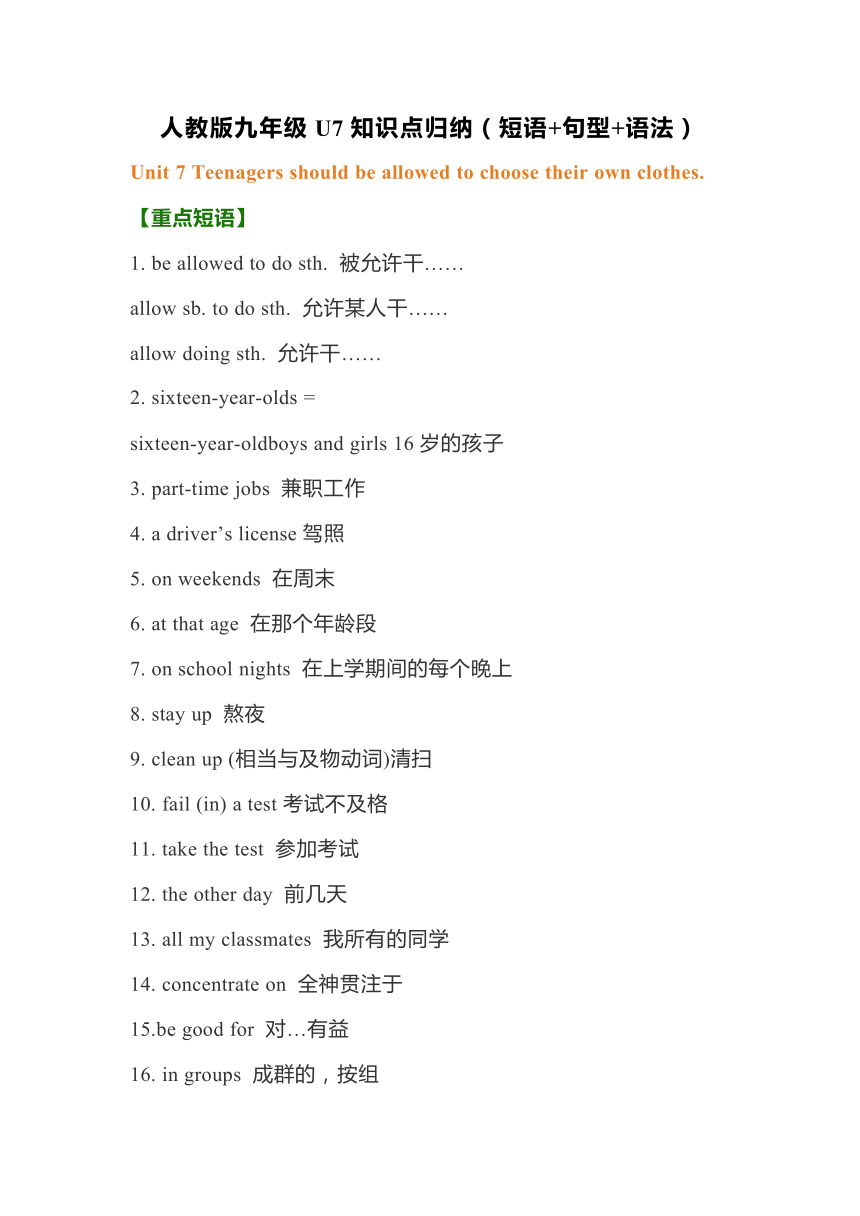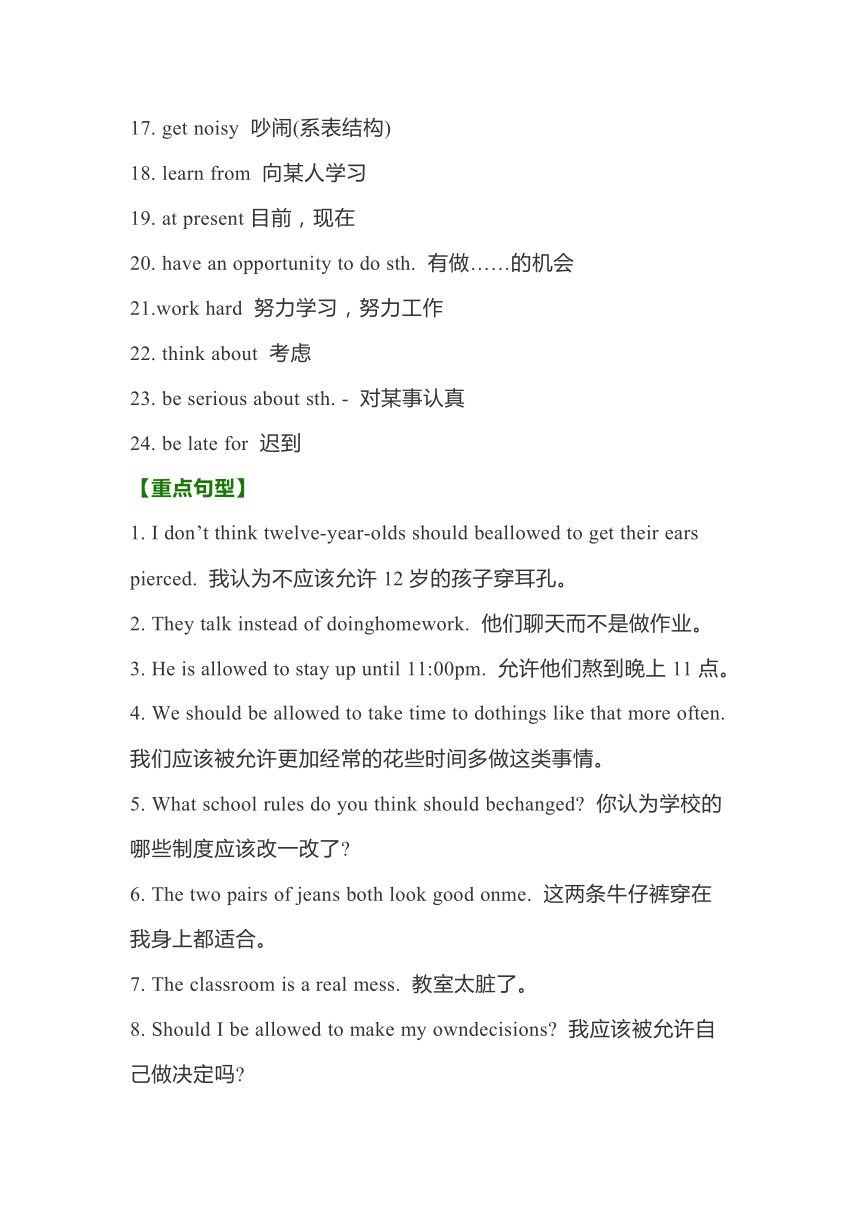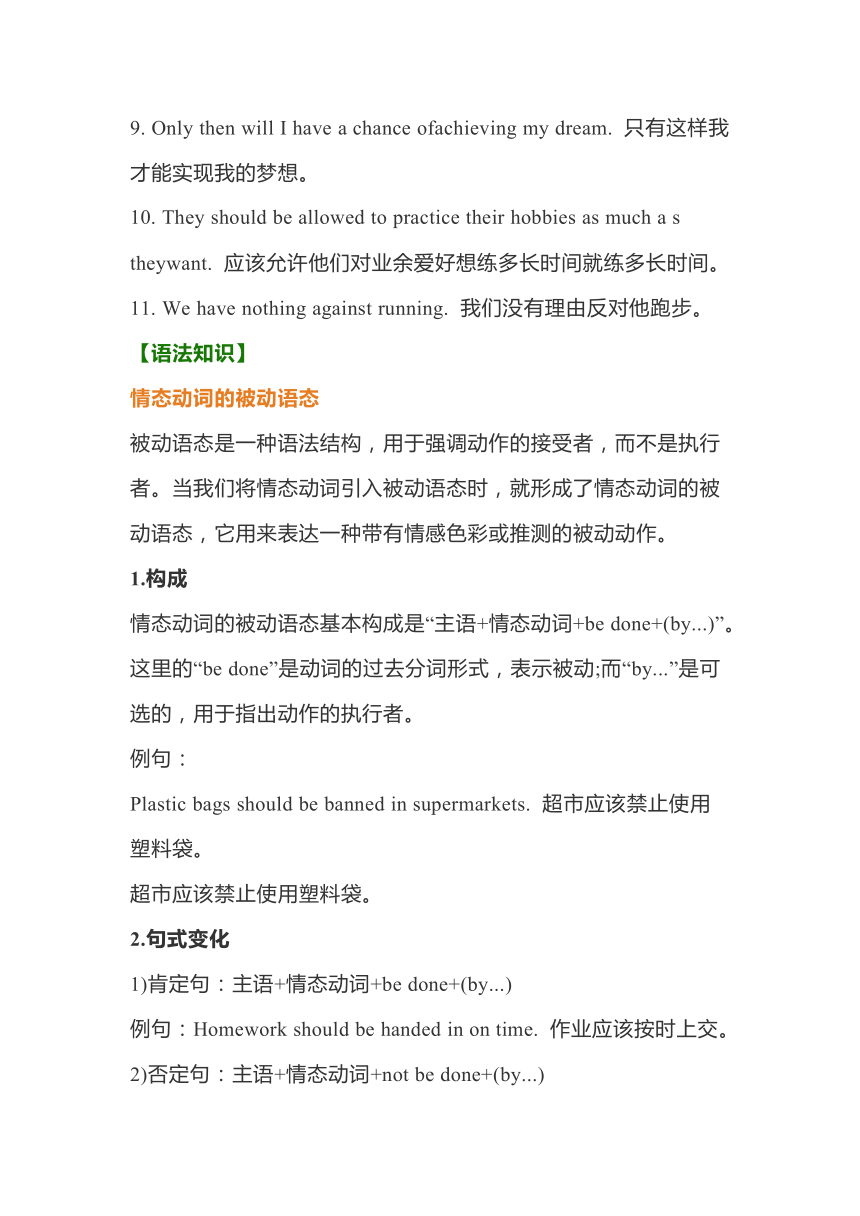Unit 7 Teenagers should be allowed to choose their own clothes知识点归纳(短语+句型+语法)
文档属性
| 名称 | Unit 7 Teenagers should be allowed to choose their own clothes知识点归纳(短语+句型+语法) |  | |
| 格式 | docx | ||
| 文件大小 | 21.2KB | ||
| 资源类型 | 教案 | ||
| 版本资源 | 人教新目标(Go for it)版 | ||
| 科目 | 英语 | ||
| 更新时间 | 2024-09-20 15:05:40 | ||
图片预览



文档简介
人教版九年级U7知识点归纳(短语+句型+语法)
Unit 7 Teenagers should be allowed to choose their own clothes.
【重点短语】
1. be allowed to do sth. 被允许干……
allow sb. to do sth. 允许某人干……
allow doing sth. 允许干……
2. sixteen-year-olds =
sixteen-year-oldboys and girls 16岁的孩子
3. part-time jobs 兼职工作
4. a driver’s license 驾照
5. on weekends 在周末
6. at that age 在那个年龄段
7. on school nights 在上学期间的每个晚上
8. stay up 熬夜
9. clean up (相当与及物动词)清扫
10. fail (in) a test 考试不及格
11. take the test 参加考试
12. the other day 前几天
13. all my classmates 我所有的同学
14. concentrate on 全神贯注于
15.be good for 对…有益
16. in groups 成群的,按组
17. get noisy 吵闹(系表结构)
18. learn from 向某人学习
19. at present 目前,现在
20. have an opportunity to do sth. 有做……的机会
21.work hard 努力学习,努力工作
22. think about 考虑
23. be serious about sth. - 对某事认真
24. be late for 迟到
【重点句型】
1. I don’t think twelve-year-olds should beallowed to get their ears pierced. 我认为不应该允许12岁的孩子穿耳孔。
2. They talk instead of doinghomework. 他们聊天而不是做作业。
3. He is allowed to stay up until 11:00pm. 允许他们熬到晚上11点。
4. We should be allowed to take time to dothings like that more often. 我们应该被允许更加经常的花些时间多做这类事情。
5. What school rules do you think should bechanged 你认为学校的哪些制度应该改一改了
6. The two pairs of jeans both look good onme. 这两条牛仔裤穿在我身上都适合。
7. The classroom is a real mess. 教室太脏了。
8. Should I be allowed to make my owndecisions 我应该被允许自己做决定吗
9. Only then will I have a chance ofachieving my dream. 只有这样我才能实现我的梦想。
10. They should be allowed to practice their hobbies as much a s theywant. 应该允许他们对业余爱好想练多长时间就练多长时间。
11. We have nothing against running. 我们没有理由反对他跑步。
【语法知识】
情态动词的被动语态
被动语态是一种语法结构,用于强调动作的接受者,而不是执行者。当我们将情态动词引入被动语态时,就形成了情态动词的被动语态,它用来表达一种带有情感色彩或推测的被动动作。
1.构成
情态动词的被动语态基本构成是“主语+情态动词+be done+(by...)”。
这里的“be done”是动词的过去分词形式,表示被动;而“by...”是可选的,用于指出动作的执行者。
例句:
Plastic bags should be banned in supermarkets. 超市应该禁止使用塑料袋。
超市应该禁止使用塑料袋。
2.句式变化
1)肯定句:主语+情态动词+be done+(by...)
例句:Homework should be handed in on time. 作业应该按时上交。
2)否定句:主语+情态动词+not be done+(by...)
例句:People should not be encouraged to quit. 人们不应该被鼓励放弃。
3)一般疑问句:情态动词提前,后接主语和be done结构。
例句:Should people be encouraged to quit 人们应该被鼓励放弃吗
4)特殊疑问句:在一般疑问句的基础上,加入特殊疑问词。
例句:When should the homework be handed in 作业应该什么时候上交
3.特殊考点
在使用情态动词的被动语态时,还需要注意短语变被动时要保持其完整性。
比如,“You must take care of the baby carefully.”变为被动语态时,应为“The baby must be taken care of carefully.”,确保“take care of”这一短语在被动语态中仍然完整。
4.祈使句与被动句的转换
在英语中,祈使句通常用于表达命令、请求或建议,其主语(通常为“你”或“你们”)常被省略。
而当我们需要将祈使句转换为被动句时,一个常用的句式是“Let+宾语+be+过去分词”。这样的转换不仅改变了句子的语态,还使句子的焦点从执行者转移到了受动者上。
例句:Let the windows be closed before the rain comes. 在雨来之前关上窗户。
否定祈使句:Don't let+宾语+be+过去分词
例句:Don't let the secrets be spilled out of your mouth. 不要让秘密从你的嘴里泄露出来。
5.主动形式表示被动意义
除了祈使句与被动句的转换,英语中还有一种特殊情况,即某些动词在主动形式下可以表达被动意义。这类动词通常包括连系动词、表示主语特征或状态的动词,以及表示开始、结束等意义的动词。
1)常见的连系动词:smell、taste、feel、sound等。
例句:“The flowers smell sweet. 这些花闻起来很香。
2)表示主语特征、状态的动词:如wash、write、sell、read、open、cut、keep、lock、clean等。
例句:“The book reads easily. 这本书读起来很容易。
3)表示开始、结束类的动词:如start、begin、close、finish、stop、end等。
例句:“The concert started at 8 p.m. sharp. 音乐会准时在晚上8点开始。
4)need、want、require等词后的动名词,是主动形式表被动意义,相当于动词不定式的被动形式。
例句:My car wants servicing soon. 我的车很快需要保养了。
这里,“wants”后接动名词“servicing”,同样表达了被动意义。
5)“worth”后跟动名词的主动形式来表示被动意义。
例句:The movie is worth watching again. 这部电影值得再看一遍。
这里,“watching”也是主动形式,但传达了电影“值得被再看”的被动含义。
Unit 7 Teenagers should be allowed to choose their own clothes.
【重点短语】
1. be allowed to do sth. 被允许干……
allow sb. to do sth. 允许某人干……
allow doing sth. 允许干……
2. sixteen-year-olds =
sixteen-year-oldboys and girls 16岁的孩子
3. part-time jobs 兼职工作
4. a driver’s license 驾照
5. on weekends 在周末
6. at that age 在那个年龄段
7. on school nights 在上学期间的每个晚上
8. stay up 熬夜
9. clean up (相当与及物动词)清扫
10. fail (in) a test 考试不及格
11. take the test 参加考试
12. the other day 前几天
13. all my classmates 我所有的同学
14. concentrate on 全神贯注于
15.be good for 对…有益
16. in groups 成群的,按组
17. get noisy 吵闹(系表结构)
18. learn from 向某人学习
19. at present 目前,现在
20. have an opportunity to do sth. 有做……的机会
21.work hard 努力学习,努力工作
22. think about 考虑
23. be serious about sth. - 对某事认真
24. be late for 迟到
【重点句型】
1. I don’t think twelve-year-olds should beallowed to get their ears pierced. 我认为不应该允许12岁的孩子穿耳孔。
2. They talk instead of doinghomework. 他们聊天而不是做作业。
3. He is allowed to stay up until 11:00pm. 允许他们熬到晚上11点。
4. We should be allowed to take time to dothings like that more often. 我们应该被允许更加经常的花些时间多做这类事情。
5. What school rules do you think should bechanged 你认为学校的哪些制度应该改一改了
6. The two pairs of jeans both look good onme. 这两条牛仔裤穿在我身上都适合。
7. The classroom is a real mess. 教室太脏了。
8. Should I be allowed to make my owndecisions 我应该被允许自己做决定吗
9. Only then will I have a chance ofachieving my dream. 只有这样我才能实现我的梦想。
10. They should be allowed to practice their hobbies as much a s theywant. 应该允许他们对业余爱好想练多长时间就练多长时间。
11. We have nothing against running. 我们没有理由反对他跑步。
【语法知识】
情态动词的被动语态
被动语态是一种语法结构,用于强调动作的接受者,而不是执行者。当我们将情态动词引入被动语态时,就形成了情态动词的被动语态,它用来表达一种带有情感色彩或推测的被动动作。
1.构成
情态动词的被动语态基本构成是“主语+情态动词+be done+(by...)”。
这里的“be done”是动词的过去分词形式,表示被动;而“by...”是可选的,用于指出动作的执行者。
例句:
Plastic bags should be banned in supermarkets. 超市应该禁止使用塑料袋。
超市应该禁止使用塑料袋。
2.句式变化
1)肯定句:主语+情态动词+be done+(by...)
例句:Homework should be handed in on time. 作业应该按时上交。
2)否定句:主语+情态动词+not be done+(by...)
例句:People should not be encouraged to quit. 人们不应该被鼓励放弃。
3)一般疑问句:情态动词提前,后接主语和be done结构。
例句:Should people be encouraged to quit 人们应该被鼓励放弃吗
4)特殊疑问句:在一般疑问句的基础上,加入特殊疑问词。
例句:When should the homework be handed in 作业应该什么时候上交
3.特殊考点
在使用情态动词的被动语态时,还需要注意短语变被动时要保持其完整性。
比如,“You must take care of the baby carefully.”变为被动语态时,应为“The baby must be taken care of carefully.”,确保“take care of”这一短语在被动语态中仍然完整。
4.祈使句与被动句的转换
在英语中,祈使句通常用于表达命令、请求或建议,其主语(通常为“你”或“你们”)常被省略。
而当我们需要将祈使句转换为被动句时,一个常用的句式是“Let+宾语+be+过去分词”。这样的转换不仅改变了句子的语态,还使句子的焦点从执行者转移到了受动者上。
例句:Let the windows be closed before the rain comes. 在雨来之前关上窗户。
否定祈使句:Don't let+宾语+be+过去分词
例句:Don't let the secrets be spilled out of your mouth. 不要让秘密从你的嘴里泄露出来。
5.主动形式表示被动意义
除了祈使句与被动句的转换,英语中还有一种特殊情况,即某些动词在主动形式下可以表达被动意义。这类动词通常包括连系动词、表示主语特征或状态的动词,以及表示开始、结束等意义的动词。
1)常见的连系动词:smell、taste、feel、sound等。
例句:“The flowers smell sweet. 这些花闻起来很香。
2)表示主语特征、状态的动词:如wash、write、sell、read、open、cut、keep、lock、clean等。
例句:“The book reads easily. 这本书读起来很容易。
3)表示开始、结束类的动词:如start、begin、close、finish、stop、end等。
例句:“The concert started at 8 p.m. sharp. 音乐会准时在晚上8点开始。
4)need、want、require等词后的动名词,是主动形式表被动意义,相当于动词不定式的被动形式。
例句:My car wants servicing soon. 我的车很快需要保养了。
这里,“wants”后接动名词“servicing”,同样表达了被动意义。
5)“worth”后跟动名词的主动形式来表示被动意义。
例句:The movie is worth watching again. 这部电影值得再看一遍。
这里,“watching”也是主动形式,但传达了电影“值得被再看”的被动含义。
同课章节目录
- Unit 1 How can we become good learners.
- Section A
- Section B
- Unit 2 I think that mooncakes are delicious!
- Section A
- Section B
- Unit 3 Could you please tell me where the restroom
- Section A
- Section B
- Unit 4 I used to be afraid of the dark.
- Section A
- Section B
- Unit 5 What are the shirts made of?
- Section A
- Section B
- Review of Units 1-5
- Unit 6 When was it invented?
- Section A
- Section B
- Unit 7 Teenagers should be allowed to choose their
- Section A
- Section B
- Unit 8 It must belong to Carla.
- Section A
- Section B
- Unit 9 I like music that I can dance to.
- Section A
- Section B
- Unit 10 You're supposed to shake hands.
- Section A
- Section B
- Review of Units 6-10
- Unit 11 Sad movies make me cry.
- Section A
- Section B
- Unit 12 Life is full of the unexpected
- Section A
- Section B
- Unit 13 We're trying to save the earth!
- Section A
- Section B
- Unit 14 I remember meeting all of you in Grade 7.
- Section A
- Section B
- Review of Units 11-14
